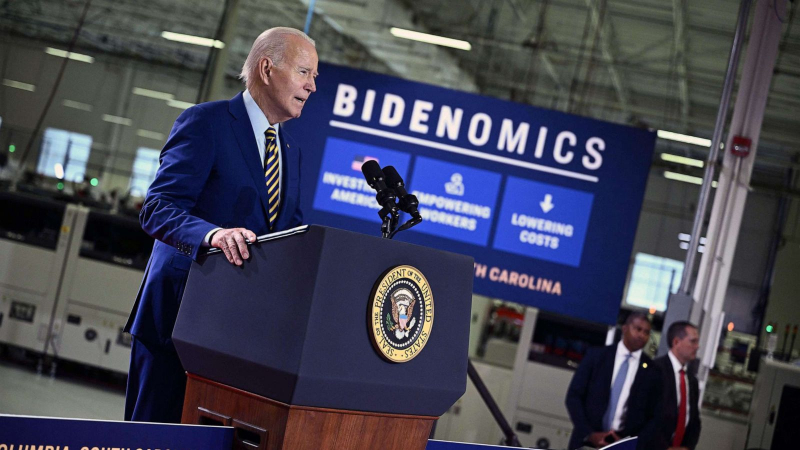- NCP Demands Impeachment, Arrest of President |
- PM Pledges to Modernise, Strengthen Border Force |
- Dhaka Tops Global Pollution List with Hazardous Air |
- Country Observes Martyred Army Day Today |
- 100 CSOs rally against Trump’s trade tactics, urge access to drugs |
Biden sells economic strength, but voters aren't buying yet

US President Joe Biden has good news to sell on the economy as he seeks reelection in November -- but voters don't seem to be buying it.
Growth is up, unemployment is down, and the US economy is recovering from the Covid-19 pandemic better than most other countries thanks to a huge stimulus package.
The problem for the Democrat's campaign for a second term in office is that most Americans are not feeling the improvement in the place that matters most: their wallets, reports BSS.
Inflation is mostly declining, but stubbornly high prices mean people are still struggling to put food on the table, pay the rent or run their car, whatever the government numbers say.
Biden will be trying to convince them that things will get better as he heads on Friday to his first economy-focused campaign event of 2024, in Allentown in the crucial battleground state of Pennsylvania.
After inflation figures rose more than anticipated on Thursday, he boasted of creating 14 million jobs since taking office -- but conceded there was "much more work to do to lower costs for American families and American workers."
Joanne Hsu of the University of Michigan, whose department publishes a monthly consumer confidence survey that's closely followed by markets, said the mood in the United States was improving -- but slowly.
"There is plenty of evidence in our survey that consumers do recognize the areas of strength in our economy," Hsu told AFP.
"However, what they don't feel good about ... is that inflation, high prices specifically, continue to weigh down on their economic experiences."
Prices in particular have not come down to pre-pandemic levels, making a trip to the supermarket in America a punishing experience for many families.
"Consumers are still really struggling to accept that we're not going back to 2019," said Hsu.
- 'Bidenomics' -
Biden showed his frustration as he headed off on his Christmas holidays. Asked by a journalist how he viewed the economy in 2024, he shot back: "All good. Take a look. Start reporting it the right way."
The 81-year-old is already facing historically low approval ratings and is neck-and-neck or behind likely Republican challenger Donald Trump, the man he beat in 2020.
With the political wisdom saying that US elections are won on "the economy, stupid" -- as the 1992 Bill Clinton campaign famously said -- Biden could have been forgiven for thinking the economy would work in his favor.
Biden's confidence that the economy would woo voters saw the White House last year rebrand his policies "Bidenomics" as they tried to sell the good news to voters last year.
"Bidenomics" in particular involved his signature Inflation Reduction Act (IRA), which involved spending hundreds of billions of dollars to revamp infrastructure and kickstart high-tech manufacturing and green energy and technology.
But many of those projects are years in the making, and won't bear fruit for voters until after the election. Another issue is that many are regional projects that local -- sometimes Republican -- officials can take credit for.
And the risk with Bidenomics was that any economic gloom would then be tied to him as well -- and so it proved. The slogan was quietly dropped late last year, although it seems to be back as the campaign begins in earnest.
As a result the campaign has switched to attacking Trump as a threat to democracy, with Biden's first two speeches of the year focusing on that and barely mentioning the economy.
Trump responded by saying he hoped the economy would crash -- earning a further rebuke from Biden.
"The White House has experimented with messages that are more affirmative, talking about the President's record. They haven't really moved the needle so far," said William Galston, senior fellow at the Brookings Institution.
Analysts say Biden's best hope now is a simple but quite specific number: that wages continue to rise faster than prices as they have done since April of last year, allowing consumers to feel that their wallets are fuller.
"If that doesn't happen you'll have an uphill climb," said Galston.

